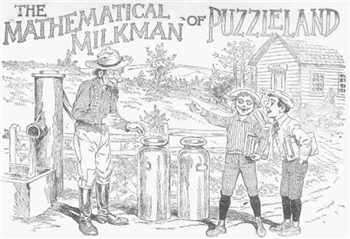The Mathematical Milkman of Puzzleland - Solution
The Puzzle:

The school children were returning to their homes when they met the mathematical milkman, who propounds the following problem:
In one of the two cans there is milk which is so rich with cream that it becomes absolutely necessary to dilute it with a little water to make it wholesome.
Therefore, in the other can there is some pure spring water, now I proceed to pour spring water from can No. 1 into can No. 2 sufficient to double its contents, and then repour from No. 2 into No.1 enough of the mixture to double the contents.
Then to equalize matters, I again pour from No. 1 into No. 2 to double the contents of No. 2 and find the same number of gallons of milk in each can, although there is one more gallon of water in can No. 2 than there is milk, so I want you to tell me how much more water than milk is there in can No. 1?
Our Solution:
Suppose, in the beginning there was x gallons of spring water in can No 1 and y gallons of milk in can No. 2 then,
| can No. 1 | can No. 2 | |
|---|---|---|
| In the Beginning | x gallons of water | y gallons of milk |
| After doubling contents of Can 2 | x-y water = x-y, milk = 0 | 2y water = y, milk = y |
| After doubling contents of Can 1 | 2(x-y) water = 2(3/4)(x-y), milk = 2(1/4)(x-y) | 2y-(x-y) i.e. (3y-x) water = (1/2)(3y-x), milk = (1/2)(3y-x) |
| After doubling contents of Can 2 | 2(x-y)-(3y-x) i.e. (3x-5y) water = (3/4)(3x-5y), milk = (1/4)(3x-5y) | 2(3y-x) water = (5/4)(3y-x), milk = (3/4)(3y-x) |
Now, we know that the number of gallons of Milk in Can 1 = number of gallons of Milk in Can 2
Hence: (1/4)(3x-5y) = (3/4)(3y-x)
Multiply by 4: 3x-5y = 3(3y-x)
Move x to one side and y to other: 6x = 14y
And so: x = (14/6)y
We ALSO know that the number of gallons of Water in Can 2 = number of gallons of Milk in Can 2 PLUS 1
Hence (5/4)(3y-x) = (3/4)(3y-x) +1
Multiply by 4: 5(3y-x) = 3(3y-x) + 4
Simplify: 2(3y-x) = 4
Replace "x" with "(14/6)y": 2(3y-(14/6)y) = 4
Simplify: (4/3)y = 4
Hence: y = 3
Now we know y=3, we also know that x = (14/6)y = 7
Hence, there was initially 7 gallons of water in can No. 1 and 3 gallons of milk in can No 2.
After all the mixings there would be 4½ gallons of water and 1½ gallons of milk in can No. 1 and 2½ gallons of water and 1½ gallons of milk in can No 2.
Hence, there is 3 more gallons of water than milk in can No 1.